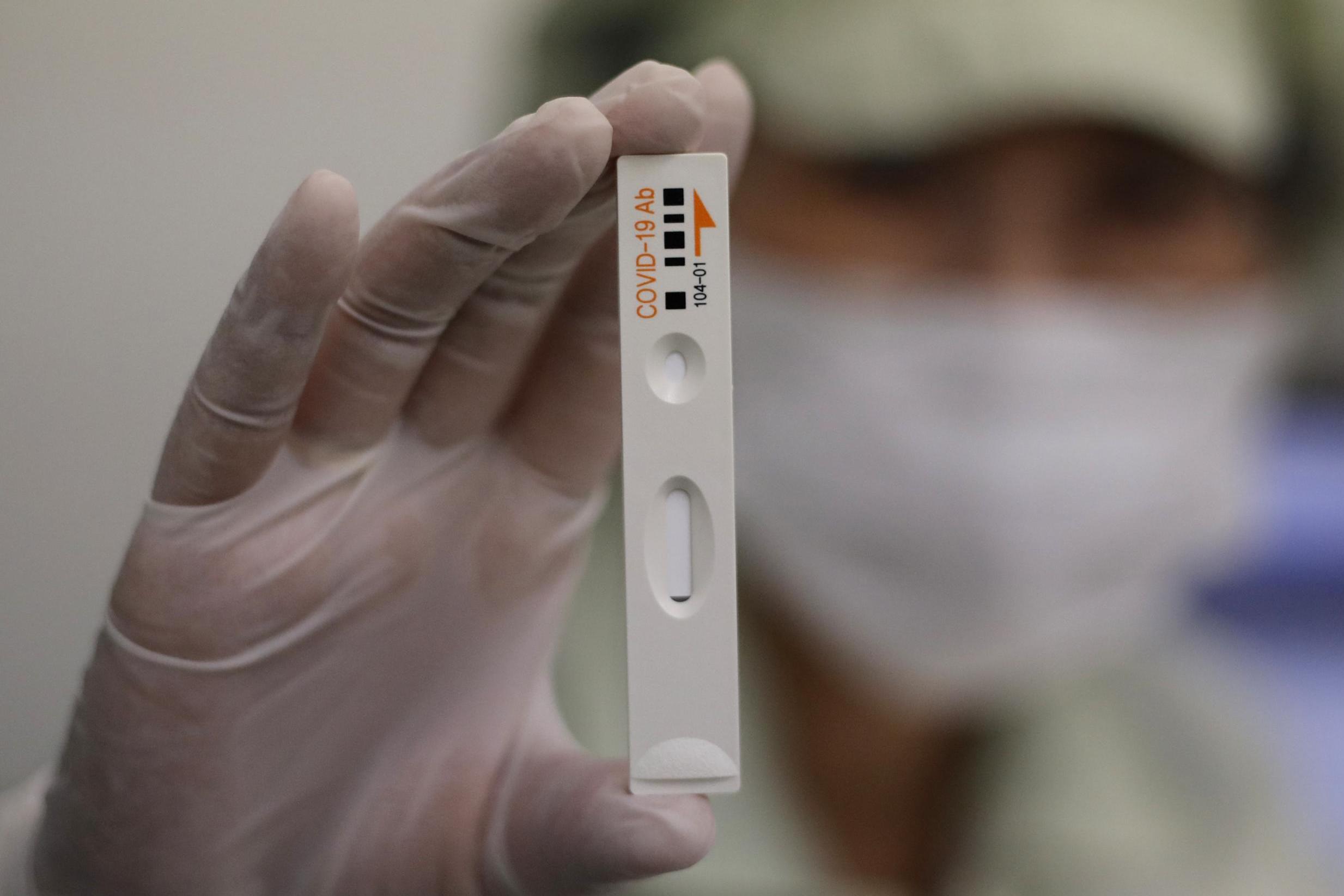Coronavirus: Experts warn against focusing too much on antibody tests
Leader of Rapid Testing Consortium says tests ‘close to picking up 100 per cent of all cases where people have antibodies’

Experts on the government’s scientific advisory group (Sage) have warned against putting too much hope in antibody tests, as reports the government has ordered up to 50 million of them emerged on Sunday.
The Mail on Sunday reported that following a breakthrough by scientists at the University of Oxford, ministers have ordered tens of millions of home test kits despite a report from the World Health Organisation (WHO) warning there is “no evidence” that people who have recovered are protected against reinfection.
But Jeremy Farrar, director of the Wellcome Trust and a Sage member, said such a test would be very useful, but is a “distraction” and takes the focus away from increasing testing for the virus.
Mr Farrar said on Twitter: “In Covid-19, reliable, robust rapid test for antibodies would be very useful and science, R&D must continue at pace. But are a distraction until we have one.
“Focus now must be massive increase testing virus, ELISA for Ab, isolation, contact tracing and clinical care.”
The WHO warned earlier this week that antibody testing has not yet been proven as a reliable next step for countries seeking to lift lockdown restrictions, and advised against issuing “immunity passports” and “risk-free certificates”.
The United Nations agency insists that the low levels of neutralising antibodies in the blood in cases of people who have recovered from Covid-19 are not enough to guarantee immunity.
A new report by Imperial College reiterated the WHO’s warning, and said that the tests are only 90 per cent reliable or less on rapid diagnostic tests.
The paper, co-authored by Sage member Professor Neil Ferguson, also cautioned against using results from antibody tests as the basis for “immunity passports”.
It said: “There are significant technical and ethical challenges to the use of immunity passports. The first relates to the specificity of antibody testing, which is only about 90 percent or lower for rapid diagnostic tests but likely higher for ELISA done in the laboratory depending on the choice of antigen.
“A second challenge is whether detectable antibody or PCR evidence of infection means protection against Covid-19, and if so, for how long.”
According to reports, the home tests would allow people to return to work and normal socialising activities. They involve taking a pinprick of blood for analysis, and works like a pregnancy test, in which two lines will appear if the antibodies are present in the blood.
The Mail on Sunday said the Reliable Testing Consortium (RTC) believes it could produce up to 1 million of the tests a week by June, amounting to 50 million by 2021.
Minister of innovation at the Department of Health and Social Care, Lord Jim Bethell, was quoted as saying by the newspaper: “This is a great story of how our manufacturers are stepping up to the challenge of Covid and I am hopeful that their product will make an impact in our battle against this terrible disease.”
Mr Bethell then tweeted on Sunday: “Good luck to the Rapid Testing Consortium. Great to see Oxford University’s excellent Covid research put to work. People want to know if they’ve had the disease, with a test they can trust. This looks like a big step in the right direction.”
The government previously ordered 3.5 million antibody tests from China in hopes they would play a role in lifting lockdown measures, but testing chief Professor John Newton admitted in early April that none of the tests were fit for widespread use.
The tests were “not good enough to be worth rolling out in very large scale”, said Prof Newton. Matt Hancock also acknowledged that early analysis of the tests from China showed “some of them have not performed well”.
A new study, led by the National Covid Testing Scientific Advisory Panel, said rapid coronavirus antibody home tests cannot currently be relied on to provide accurate results, but a laboratory process, known as Elisa, showed promising results in indicating the presence of Covid-19 antibodies.
The researchers noted in their study there is an urgent need for robust antibody detection approaches to support diagnostics, vaccine development, safe individual release from quarantine and population lockdown exit strategies.
But their findings showed the performance of current lateral flow immunoassay (LFIA) home test devices was “inadequate for most individual patient applications”.
Subscribe to Independent Premium to bookmark this article
Want to bookmark your favourite articles and stories to read or reference later? Start your Independent Premium subscription today.

Join our commenting forum
Join thought-provoking conversations, follow other Independent readers and see their replies